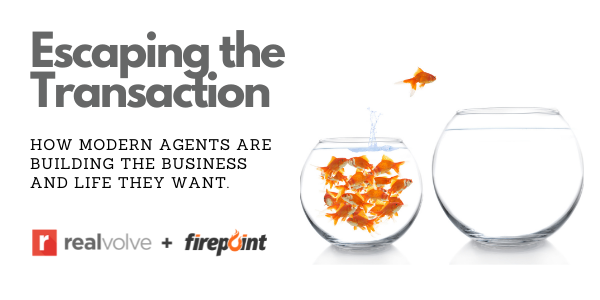It’s time for a revolt against hustle culture.
What is hustle culture? It’s working from paycheck to paycheck, one eye always on the stack of bills; putting in too many hours of work and not even enjoying time off; hungry for new deals but never managing to squeeze in face time with the people behind the numbers; not getting enough sleep and drinking too much coffee and neglecting mental health.
Hustle culture is toxic, and we’re finally waking up to that reality. Michael Thorne, realtor and co-host of My Agent TV, recently sat down with us to talk through how real estate agents can escape the hustle and rethink the way they work.
 Click here to watch the webinar
Click here to watch the webinar
So slow down for a minute and think about your business. Really think. Get so lost in thought that people start giving you funny looks.
Here’s what you need to think about, according to Michael:
- What does success mean to you?
- What investments can you make now that will benefit your business in the long term?
- What changes can you make to your marketing to position your client (not yourself) as the hero of the story?
- Which parts of your process can be automated?
Let’s dive deeper into each of these topics.
Create your own definition of success
The real estate industry has established its definition of success—the top performers are whoever can complete the most transactions and bring in the most sales volume.
But that’s just success as defined by the industry.
“I think a lot of agents, they get so beat up by this definition our industry puts on them that they take that on as their definition, and it’s just not fair, it’s the wrong way to look at it.”
Success looks different for everyone. Consider, Michael says, “a single parent making $80,000 a year who doesn’t miss any of their kid’s dance recitals. That’s success at such a huge level, and our industry doesn’t acknowledge that.”
Figure out what success means for YOU—what will make YOU happy and fulfilled. That shift in mindset is the first step to ditching the hustle.
Stop “spending” and start “investing”
Michael believes there are two types of people in the real estate industry: entrepreneurs and people who don’t want a boss. The difference between them? Entrepreneurs use the word “invest” while the latter use the word “spend.”
“Spend means there’s really no return on what you’re doing. Spend, it’s out. Spend, it’s gone,” Michael explained. “Invest means I’m going to put something in for return later on.”
Figure out what to invest in for your business—which skills to learn, which software to use, what marketing trends to leverage. Michael suggests reaching out to fellow agents for advice. “If you pick up a phone to almost any real estate agent in this business, and ask them what they’re doing and what the results are, and what the pain points are, they’ll tell you. This industry is full of remarkable human beings.”
The biggest factor when choosing whether to invest in something new is whether it will benefit your clients. “Almost always, our clients are the priority when we make a change. It’s always a mindset of, ‘Does the client win, when we invest our time doing something?’”
When his team invested in going paperless, for example, the benefit to clients was that the agents had more time freed up to spend with them.
Michael’s favorite investment to make is fixing a problem that wasn’t his fault. “So, there’s a story of a client of mine…this was about four years ago, [before dual agency was illegal in our marketplace]…we were selling a home and we also had the buyer. The night before the new buyers moved into the house, there was a windstorm. I got a phone call in the morning from the current owners of that property saying, ‘Hey Michael, what do I do? Part of the tree fell off last night and went through the roof of the shed and the roof is destroyed.’”
“I said, ‘Don’t worry about it. I’ll take care of it. You’re moving to your new home today. Pretend it never happened.’”
“So I rushed down into the property, knowing that the first time homebuyer would want to be there. Chris and Alina, sure enough, were already there, and they had this ghostly look on their faces. Well, they had a contractor coming to the property later that day to give them a quote on remodeling the bathrooms. So I went back there that afternoon, and I said to the contractor, ‘How much is it going to cost to put on a new roof?’ He said, ‘It’s going to be 300 bucks and a day’s worth of labor.’ I said, ‘Put a new roof on.'”
Michael paid for the new roof. For just $300, he resolved an emotional situation for his clients and made a valuable investment in that relationship. And he saw the rewards almost immediately. Just one month later, Chris and Alina sent Michael a new pair of clients looking to buy a home. When those clients moved in, they discovered the dishwasher wasn’t working, so Michael gifted them a check for $500 to get a new one. And they, in turn, sent him two more clients. There’s no telling how many new deals Michael will continue to receive, all because he was willing to invest a few hundred dollars in his clients’ home-buying experiences.
“If you’re only willing to put into the funnel what you can reap out that quarter, you’re missing a huge opportunity for compound interest,” Michael said. But if you’re willing to invest $300 or $500 to solve the problem of a distressed client, you’ll reap those rewards for years to come. Investing in your client relationships is the most important thing you can do.
But yes, at the beginning of your career, you might have to hustle. Michael doesn’t deny it. “I get it. I was a new agent, we were all new agents, and we had that office bill and that desk fee and that feeding my family and paying my mortgage staring us in the eye. So yes, I understand that at some point, you might have to be a bit more transactional, but as soon as you can start shifting that mindset to thinking long term, I can’t tell you how beneficial it is to your business.”
Recognize that your client is the hero of your story
Hustle culture would have us believe that our marketing should be all about ME and how hard I’M working. How often have you seen something like “#1 Real Estate Agent in Tulsa” plastered across an ad?
That kind of message makes you out to be the hero of your story. But what Michael has realized, after studying the StoryBrand concept developed by Donald Miller, is that your clients should be the hero of the story.
“So, the basic breakdown of a story is there’s a character—a hero—who has a problem. ‘I need to buy my home,’ I need to sell my home,’ whatever it is. That person meets a guide. That’s what we are, we’re the guide.”
“So one of the easiest examples is Star Wars. So Luke Skywalker has a problem, and he meets a guide. In episode four, it’s Obi-Wan Kenobi; in episode five, it’s Yoda. That guide gives him a plan to fix his problem. The reason why the guide is so powerful is because they’ve done it before, they’ve done it 1000 times, and it’s the hero’s first time through this problem.”
The StoryBrand concept gives you a great framework for crafting your marketing messages. Position your target audience as the hero of the story (“and stories can be as long as a book or as short as two sentences in a social media post”), and position yourself as the guide who is going to help them reach their goal.
Be the Yoda to your client’s Luke Skywalker.
Embrace automation
One of your greatest weapons against hustle culture is automation technology. When you can automate tedious, repetitive, time-consuming tasks, you no longer have to spend long hours alone at your desk. Instead, you have more time to call up past clients, meet with people face-to-face, send personalized video emails—all of those important relationship-building activities.
You might fear that automation technology will eliminate the human aspects of your business. But, in fact, automation allows you to be more human. For example, Michael’s team uses Realvolve, and they have dozens of pre-written email templates saved (which means they don’t have to spend time writing each message from scratch)—but before they click Send, they have the option to go in and make it more personalized for the individual who will be receiving it.
Automation also allows Michael’s team to label contacts with tags like first time buyer and repeat buyer to ensure that all of their different types of clients receive highly relevant content. “If I have a resale client, and one of the emails that goes out is, ‘If you’re a first time homebuyer, did you know that there’s these incentives?’ Now it sounds like you didn’t listen to them, now they feel like they are getting a blanket experience because you’re sending them an email that doesn’t apply to them.”
“Technology doesn’t get between us and our client. It gets behind us so we can be closer to our client.”
Automation allows you to enjoy your time off. Michael’s entire process is built out in Realvolve workflows, ensuring that not a single step is missed. Some of the steps happen automatically, some require a phone call or some quick data entry, but Michael can see it all in front of him. And when he takes the weekend off or goes on vacation, he can truly relax, knowing that everything is taken care of.
Want to learn more about Realvolve? Let’s talk!
Don’t believe the hype
Hustle culture is unhealthy and unsustainable. At some point, you’re going to burn out. So instead, stop and think about how you can build a business that will last for the long haul. Reject the default definition of success and decide what you want for your life. Set long term goals and make wise investments in your business. Shift your mindset from “I’m the hero” to “I’m the guide.” And find the right automation technology for you.
You deserve a good night’s sleep. You deserve to relax on your days off. You deserve to love what you do and continue to grow as an agent without suffering from burnout ten years down the road.
You can escape the hustle.





